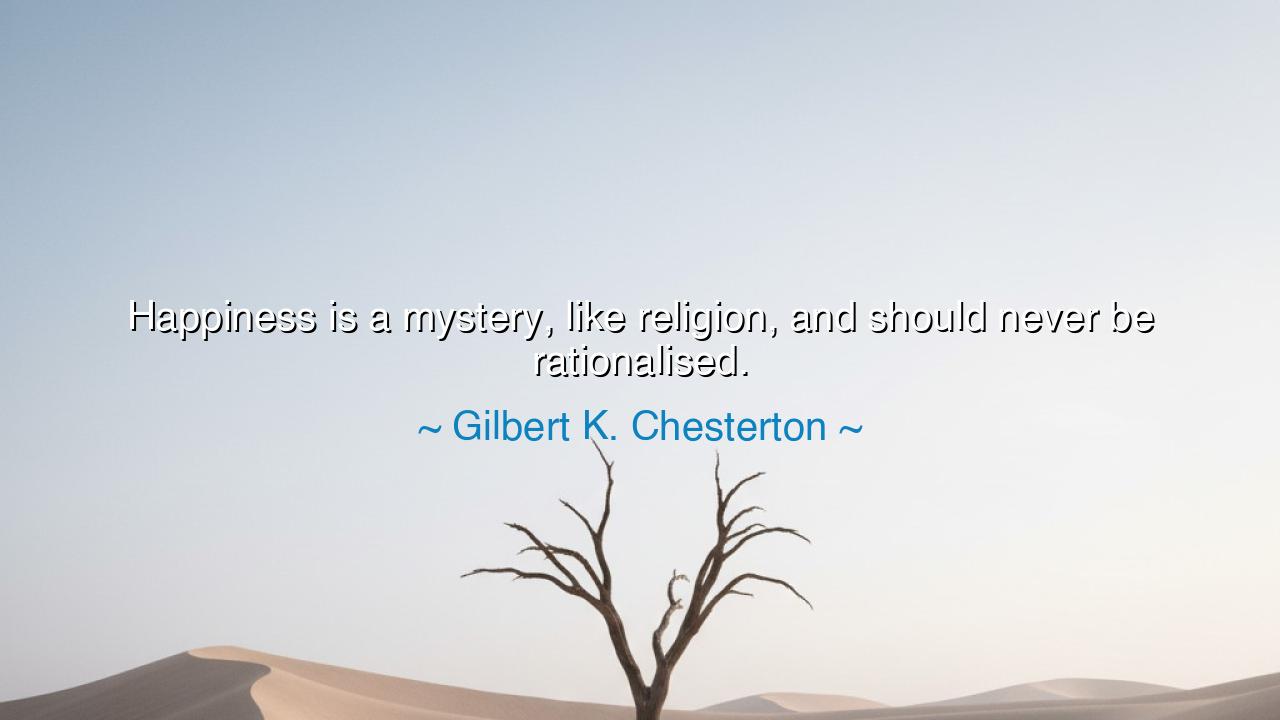
Happiness is a mystery, like religion, and should never be






“Happiness is a mystery, like religion, and should never be rationalised.” Thus wrote Gilbert K. Chesterton, the English philosopher, poet, and defender of wonder. In this saying, he captures the ancient truth that happiness, like faith, is not something to be dissected or explained, but to be lived, felt, and revered. He warns that when we try to measure joy as though it were a formula, or to reason it into obedience, it slips from our grasp like water from a closed fist. Happiness, he teaches, is a mystery — not because it cannot be known, but because it must be experienced in humility, not conquered by intellect.
Chesterton was a man of paradox, who saw beauty in contradictions and holiness in ordinary things. To him, the world was enchanted — every sunrise a miracle, every smile a quiet act of faith. When he speaks of happiness as a mystery, he is not denying reason; he is restoring awe. He reminds us that the greatest truths of life — love, laughter, belief — cannot be confined by logic. Just as religion calls the soul to trust what cannot be proven, happiness calls the heart to rejoice without reason. To rationalise it is to flatten its mystery, to take the music of life and reduce it to mathematics.
This wisdom echoes the teachings of the ancients. The Stoics taught that joy comes not from control, but from acceptance. The Buddha declared that peace is found not through reasoning about desire, but through letting go of it. And the mystics of every age — from Saint Francis to Rumi — have spoken of happiness as a flame that burns brightest when not grasped. The mind seeks to understand; the soul seeks to experience. Chesterton stands in their lineage, calling out to a restless, analytical age: “Do not ask why you are happy — simply give thanks that you are.”
Consider the story of Helen Keller, who lost both sight and hearing before she could speak, and yet who lived a life overflowing with joy. She could not explain happiness, nor did she try to. When asked about her contentment, she said, “Keep your face to the sunshine and you cannot see a shadow.” Her life was proof that happiness cannot be built by logic or circumstance — it blossoms from the spirit, from gratitude, from love. Had she sought to rationalise her joy, she might have found only bitterness. Instead, she embraced the mystery, and through that surrender, she found light.
Chesterton’s words also stand as a challenge to the modern mind — a mind that seeks to analyze everything, even the soul. We speak of “happiness studies,” of brain chemistry, of external metrics and goals, as though joy were an equation to be solved. Yet the more we dissect it, the further it recedes. True happiness, like religion, begins where reason ends — in reverence. It is not found by searching, but by awakening. It comes not when we demand to know its cause, but when we stand still enough to feel its presence. The more we strive to explain happiness, the less we experience it.
To understand Chesterton’s insight is to see that the sacred and the joyful are intertwined. Happiness, like faith, requires surrender — a willingness to live in wonder. When a child laughs, when a lover forgives, when an old man gazes upon the dawn and smiles, there is no analysis in it; there is only being. That is the holiness of joy. In such moments, life itself becomes a prayer. Chesterton, in his brilliance, reminds us that to rationalise happiness is to rob it of its divinity. Let it remain mysterious, and it will remain alive.
So let this be the teaching: do not seek to explain happiness — live it. When joy arrives, welcome it like a guest from heaven. When it departs, bless it for having visited. Be like the ancients who bowed before mystery, not because they understood it, but because they knew it was sacred. Do not ask happiness to justify itself with reasons; let it dwell in the heart as faith does — pure, unspoken, unbound.
For in the end, Chesterton’s words are not a denial of thought, but an invitation to wonder. Happiness and religion both lose their soul when stripped of mystery. To the wise, the unknown is not a threat, but a gift — the endless well from which meaning flows. So live not as a philosopher dissecting joy, but as a poet beholding it. Let happiness remain a mystery, and it will never cease to surprise you — like grace, like love, like the divine breath that moves through all living things.






AAdministratorAdministrator
Welcome, honored guests. Please leave a comment, we will respond soon